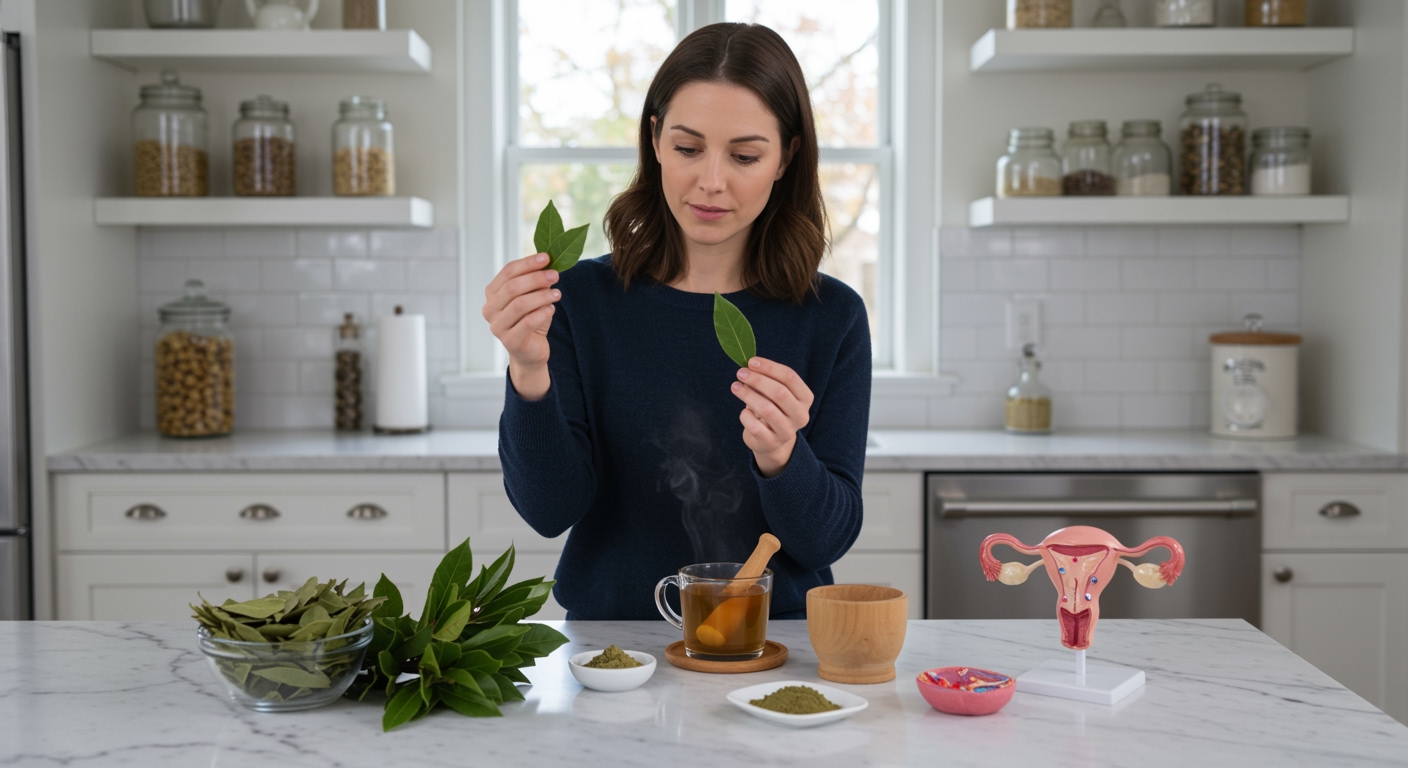✪ Key Takeaway: Bay leaves may help PCOS by improving insulin sensitivity and reducing inflammation, but more research is needed.
Introduction
You reach for bay leaves when cooking stew, but did you know this common herb might help manage PCOS symptoms?
Many women with PCOS search for natural ways to support their health alongside medical treatment.
Hi, I’m Abdur, your nutrition coach and today I’m going to explain how bay leaves might benefit women with PCOS and what the science actually says.
What Makes Bay Leaves Special For PCOS?
Bay leaves contain eugenol, a compound that may help regulate blood sugar levels.
This matters because insulin resistance affects up to 70% of women with PCOS.
The leaves also contain antioxidants like quercetin and kaempferol that fight inflammation.
Chronic inflammation drives many PCOS symptoms including irregular periods and weight gain.
Studies show bay leaf extract can improve glucose metabolism in laboratory settings.
However, most research focuses on diabetes rather than PCOS specifically.
✪ Fact: Bay leaves belong to the laurel family and have been used medicinally for over 2000 years.
How Do Bay Leaves Affect Insulin And Blood Sugar?
Research suggests bay leaves can slow carbohydrate absorption in your digestive system.
This helps prevent the sharp blood sugar spikes that worsen insulin resistance.
The polyphenols in bay leaves may also improve how your cells respond to insulin.
Better insulin sensitivity means your body needs less insulin to manage blood sugar.
Lower insulin levels can reduce androgen production in your ovaries.
Excess androgens cause many PCOS symptoms like acne, hair loss, and irregular periods.
One small study found bay leaf tea improved glucose tolerance in people with type 2 diabetes.
✪ Pro Tip: Steep bay leaves for 10-15 minutes to extract maximum beneficial compounds when making tea.
Can Bay Leaves Reduce PCOS Inflammation?
Chronic low-grade inflammation plays a major role in PCOS development and progression.
Bay leaves contain compounds that may help calm this inflammatory response.
The anti-inflammatory effects come mainly from eugenol and other volatile oils.
These compounds can reduce inflammatory markers like C-reactive protein and interleukin-6.
Lower inflammation may help improve ovarian function and hormone balance.
Some women report better energy levels and mood when inflammation decreases.
However, we need more studies specifically testing bay leaves in women with PCOS diagnosis.
✪ Note: Inflammation reduction takes weeks or months to show measurable effects on PCOS symptoms.
What Are The Best Ways To Use Bay Leaves For PCOS?
Bay leaf tea offers the most concentrated way to get beneficial compounds.
Steep 2-3 dried bay leaves in hot water for 10-15 minutes daily.
You can also add bay leaves to soups, stews, and rice dishes during cooking.
Remove whole leaves before eating since they can be sharp and hard to digest.
Ground bay leaf powder can be mixed into smoothies or yogurt in small amounts.
Start with small doses to see how your body responds before increasing intake.
Always consult your healthcare provider before using bay leaves as a therapeutic supplement.
✪ Pro Tip: Fresh bay leaves have stronger flavor but dried leaves contain more concentrated beneficial compounds.
Are There Any Risks Or Side Effects?
Bay leaves are generally safe when used as a cooking spice in normal amounts.
However, consuming large quantities may cause stomach upset or nausea.
Whole bay leaves can be a choking hazard if swallowed accidentally.
They can also cause cuts in your mouth or digestive tract due to their sharp edges.
Bay leaves may interact with diabetes medications by lowering blood sugar too much.
Pregnant and breastfeeding women should avoid medicinal doses of bay leaves.
Always discuss herbal remedies with your doctor, especially if you take prescription medications.
✪ Note: Monitor your blood sugar closely if you have diabetes and decide to try bay leaf tea regularly.
The Bottom Line
Bay leaves show promise for supporting PCOS management through their effects on insulin sensitivity and inflammation.
Natural remedies work best when combined with proven medical treatments, not as replacements for them.
I would love to hear about your experiences with bay leaves or other natural PCOS remedies in the comments below.
References
At NutritionCrown, we use quality and credible sources to ensure our content is accurate and trustworthy. Below are the sources referenced in writing this article:
- Healthline: 5 Possible Uses for Bay Leaf
- WebMD: Bay Leaf
- Allara Health: Spices and Herbs for PCOS Natural PCOS Treatment
- Frontiers in Endocrinology: Metabolic Effects of Polyphenols





